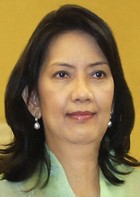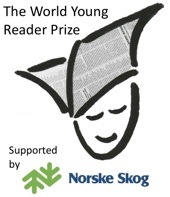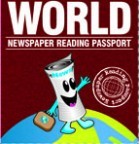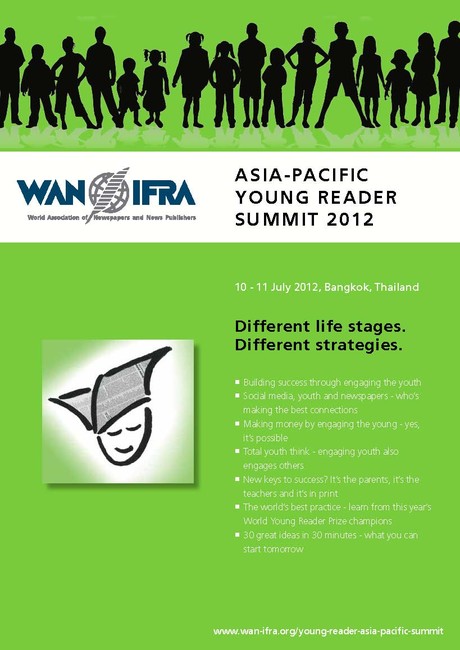Young Reader Asia-Pacific Summit
Visual

Title
Date and Location
-
10 Jul 2012 - 11 Jul 2012BangkokThailand
Price
Pre-Summit Workshop (9 July)
WAN-IFRA Member: SGD 200
Non-Member: SGD 250
Summit (10 & 11 July)
WAN-IFRA Member: SGD 1260
Non-Member: SGD 1620
Post-Summit Workshop (11 July)
WAN-IFRA Member: SGD 200
Non-Member: SGD 250
Workshop Only
WAN-IFRA Member: SGD 250
Non-Member: SGD 300
Partner and Sponsors
Sub title
Speakers
-
 Chelo Banal
Chelo BanalChelo Banal-Formoso is the editor of the Learning section of the Philippine Daily Inquirer. She...
Speakers
-
Alok Sanwal

Alok Sanwal is a media professional with over fourteen years of experience in the fields of...
-
Chelo Banal

Chelo Banal-Formoso is the editor of the Learning section of the Philippine Daily Inquirer. She...
-
Dr. Aralynn McMane

Based at the Paris headquarters of WAN-IFRA, the young readership development division strives...
-
Dr. Gerard van der Weijden

Dr. Gerard van der Weijden, is a Dutch citizen living in Belgium. After years of working for the...
-
Ivy Soon

IVY SOON has worked closely with young people throughout her 18 years in journalism. She has...
-
Jacob Mathew

Jacob Mathew, Executive Editor and Publisher of the Malayala Manorama Group of Publications in...
-
Jayant Mammen Matthew

Jayant Mammen Mathew is the Deputy Editor and Director of the Malayala Manorama group in India...
-
Mariko Horikawa

Mariko Horikawa is Deputy Manager of the Department of Research & Development Operations at...
-
Markus Pettersson

Markus Pettersson specializes in reader relations and social media at Göteborgs-Posten (GP),...
Young Reader Asia-Pacific Summit
This first WAN-IFRA “Young Reader Asia-Pacific Summit” in Thailand on 10-11 July, will look into successful, award-winning young reader initiatives of newspapers in Asia and abroad. It will provide insights into attracting young readers to newspaper content, no matter what platform.
Participants will also have the chance to attend in-depth pre- and post-conference workshops where they will explore how to build success through engaging the young.
Summit – Key topics:
- Who is making the best social media connections with the young and what it means for newspapers
- How to introduce younger thinking into a newspaper without alienating older readers
- How newspapers are making money by engaging the young
- How focusing on life stage firsts offers a key, core strategy
- Great ideas you can start at your newspaper the day you get home
- The new bright future for print thanks to parents
Check the full Summit programme here
Workshop Topics:
- Young reader and new media
- Family reading
- Readers participation
- Youth pages/sections
Check the workshops programme here
 Meet the champions!
Meet the champions!
Participants will get the chance to hear all about the world's latest best strategies as WAN-IFRA awards the 2012 World Young Reader Prizes at this session and some winners tell how they did it.
Core categories were newspapers in education, editorial, brand, making the news and public service. In addition, we'll give a two top prizes for enduring excellence, the Natasa Prize to a newspaper printing plant that is teaching the young about journalism have named a Young Reader Newspaper of the Year.
You can find all the details about who won HERE
 GerardAn interview with Gerard van der Weijden, workshop leader:
GerardAn interview with Gerard van der Weijden, workshop leader:
For Gerard van der Weijden of Belgium, making the newspaper more attractive and useful for youngsters, getting into the schools and focusing on family reading is a “piece of cake.” He will offer a workshop to a limited number of people at the Bangkok event and answered some of our questions about how he thinks we can do better:
A more attractive newspaper for youngsters, will that not scare away the present - maybe somewhat older - readers?
Of course not! If executed well, on the contrary: a more youthful approach is in general also appreciated by those present and older readers. One simple example: you interview the Minister of Labour Affairs. You ask the minister all the questions you usually ask. Just add one question: do you give your children pocket money and how much? With this question included more readers- old and young- will read the interview!
Any keys for newspapers in schools?
When you offer the schools activities to promote your newspapers two key factors to be considered : the activity should be focused on newspaper READING and make sure the activity is connected with the school curriculum.
What's one example that works in many places?
Organize on a daily or weekly base a news quiz for students. Just make sure the questions are connected with school programs of say, social science, economics, geography, history etc.
What do you mean with family reading?
The family is the key factor for youngsters to read or not to read, far more than the school is. Family reading is based on two main elements Firstly, explain to the family - mostly the parents - why reading a paper is so important (Students reading the newspaper get better school results!). And secondly offer newspaper reading activities whereby the whole family can be involved.
You are the inventor of the Reading Passport and WAN-IFRA’s World Newspaper Reading Passport – both used world wide. Why is the passport so successful?
 The Reading Passport is a booklet where in youngsters - any age, any education level- keep a record of what they read and what they feel while reading, for a certain period. This registration is co-signed by an adult -- a teacher or a (grand)parent. The common experience of the vast majority of youngsters is that they read a lot more than they realize, that reading is useful and now and then even fun. [NOTE: WAN-IFRA makes available for free the materials needed to produce a World Newspaper Reading Passport and a World Football Reading Passport. Contact aralynn.mcmane@wan-ifra.org.
The Reading Passport is a booklet where in youngsters - any age, any education level- keep a record of what they read and what they feel while reading, for a certain period. This registration is co-signed by an adult -- a teacher or a (grand)parent. The common experience of the vast majority of youngsters is that they read a lot more than they realize, that reading is useful and now and then even fun. [NOTE: WAN-IFRA makes available for free the materials needed to produce a World Newspaper Reading Passport and a World Football Reading Passport. Contact aralynn.mcmane@wan-ifra.org.
Why should people participate at the Young Reader Summit and the Young Readers workshop?
This is for everybody a rare opportunity to meet so many people being involved in young readers. It is nearly impossible not to pick four or five good ideas to implement back home. And at the workshop you will experience that at the end of the day it is very, very well possible to attract more new, young readers.
An interview: Why this? Why now? Why here?
[img_assist|nid=56978|title=|desc=|link=none|align=right|width=150|height=196]Aralynn McMane, Executive Director, WAN-IFRA Young Readership Development
What are the main new themes in young readership development?
Surprisingly, the action is equally interesting in print and digital, as well as in the core professional journalism that underpins both.
At all levels, there is a rebirth in educator and parent interest in classic newspapers in education – using the adult newspaper in the classroom as a supplemental text for just about any school topic. Studies still show that newspapers are a variable, and sometimes the key variable, in better academic achievemenet and development of citizenship values and skills. This means new avenues for funding such programmes. What we don’t know yet is if that effect transfers to our digital versions.
[img_assist|nid=53957|title=|desc=|link=none|align=left|width=140|height=145] For the pre-school and lower primary school life stages, the target remains the parents, but in new ways that tie to living with screens. There are some very interesting strategies emerging for iPads, which are so totally natural for a small child to use. Also, parents want control over their child’s screen experience and want them to spend more time away from those screens. Thus we’ve seen renewed interest in our “Internet in the Family” supplement materials that newspapers can provide parents who want to guide their children when they go online as well as an interest in printed newspaper supplements for children.
Upper primary continues to be the stage when children form their media and news consumption habits (after age 11 may even be too late). Here, there is a huge opportunity for smart, tightly targeted and authentic print publications that are compact and easy to obtain. These are not the classic efforts, poorly financed and aimed at ridiculously wide age ranges. The the best are also extremely careful to protect the ever-fragile credibility of newspaper journalism by clearly separating what is editorial content and what is selling. Safe digital experiences are key here as well as the experience of being a reporter, even for a half day. This experience can can have a superb impact on any audience, really, and is especially useful for engaging secondary students.
[img_assist|nid=56977|title=piste|desc=|link=none|align=right|width=300|height=266] For secondary students (and for upper primary students), some newspapers have created wonderful opportunities for experiencing professional journalism with all the rigor that implies. These have ranged from high-tech simulations to building a story together via social media to pretty simple and short but highly memorable opportunities that can result in the ultimate award for this otherwise digital generation: appearing in print.
It is at the next stage, university, first time living alone, that social media relationships, which are nearly primordial for the newest generation, fully kick in as friendships and other relationships become a main life focus. However, actions are most likely to succed at this point if they build upon the credibility of a news operation and the interest in news that has been built at earlier life stages. Trying to start now is too late.
Why is WAN-IFRA doing a regional young reader event?
Our merger has increased the potential for such efforts, thanks to the strong presence of subsidiaries in several regions. It make sense to bring the chance for face-to-face interaction on this topic closer to those who seek it.
Is this the first regional young reader action?
No, our Southeastern Asia office did a highly successful event in early 2011. This will be larger in both scope and geographic area, covering the Asia-Pacific region. Also, we in Paris have a long history of working with our member associations to do this kind of action within countries or regions.
Why the Asia-Pacific region?
Two reasons: First our subsidiary is very strong there, as evidenced simply by the complex annual event, Publish Asia, which attracts more than 600 people. Second, newspapers in this region are extremely vibrant in this topic and have a lot to learn from one another. For example, our 2012 Young Reader Newspaper of the Year is Jawa Pos of Indonesia and Lynne Cahill of the West Australian sits on our World Young Reader Prize jury.
Will there ever be a World Young Reader Conference again?
Yes. It’s important to give newspaper executives from all over who do this well a chance to compare notes and for newer converts to hear about cases from everywhere as you never know from where a great idea will emerge. We are aiming for a world conference for 2013. Details to come….
Contact information

Gilles Demptos
Director, Asia
WAN-IFRA
| Singapore,
Singapore
Phone: ++65-65628443
E-Mail: gilles.demptos@wan-ifra.org

